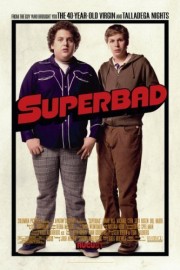Superbad
After the high-laughs, soft-hearted hits he wrote and directed in “The 40 Year-Old Virgin” and “Knocked Up,” Judd Apatow takes a back-seat on the creative side (but not on the marketing one, his name being used for maximum box-office dollars) and simply produces this comedy written by “Knocked Up” star Seth Rogan and buddie Goldberg. Unfortunately, Apatow’s magic touch doesn’t extend to “Superbad,” despite a sharp ear for dialogue and slight sense of feeling. Well, at least they try for the latter, as Rogan and Goldberg recount their days as pre-sex geeks through the typical teen comedy formula of getting to graduate and wanting one final shot of high school cool before college separates them. But mostly, “Superbad” is an exercise of raunchy comedy masquerading as a coming of-age tale, which is very much the opposite of how “Virgin” and “Knocked Up” ended up. I’ll get to why in a second…
First, though, major props to McLovin, the geek du jour- actually named Fogell- whose alias on his fake ID made him iconic before the film actually opened. As played by high schooler/non-actor Christopher Mintz-Plasse, he lives up to the hype. He’s a geek’s geek who shouldn’t be able to pass for a 25-year-old organ donor from Hawaii when he’s “trusted” with the task of getting booze for the pre-graduation blowout Seth (“Knocked Up” & “Accepted’s” Jonah Hill, hilarious as always) and Evan (whom “Arrested Development’s” Michael Cera plays with just the right blend of raunchy horndog and awkward good guy) are looking to get laid at. But the McLovin moniker gives Fogell a certain swagger, not readily noticeable, but a cache that fools both the liquor story clerk and the two cops (played by Rogan and Bill Hader with a pitch-perfect sense of arrested development) who come to take statements when the liquor store is robbed…or at least has them reminiscing too much of their youth to care how clearly fake his ID is.
Sadly, McLovin’s arc of self-discovery is lost in a wild side story that dulls the film’s narrative focus. True, McLovin in the back seat of a squad car with Rogan and Hader is responsible for some of the film’s best and biggest laughs, but I felt it threw the main story- of Seth and Evan”s strained friendship by not moving on past high school together, and their equally-interesting, but wildly different, attempts at some fun with the ladies they have crushes on. I guess since the movie’s fundamentally about all three’s respective rites of passage into adulthood, and both arcs allow for those moments (even when the film is at its’ craziest), I can allow it some slack, but there didn’t really seem to be a consistancy to the storytelling; true, it all ends up at the big party anyway, and by the end, all three are a little more enlightened, but even the leisurely-paced laughs at “Knocked Up” seemed to have a clearer path to its’ eventual conclusion. This feels more like the “throw it up and see what sticks” school of screenwriting, and it’s not just the story that feels that that way…
…the film’s liberalism with profanity and vulgar sight gags seems very slap-dash. Now, I’m normally not one to complain about an overabundance of language in this type of movie or any movie, but the sheer volume in this movie seemed to dull some of the laughs, and some of the insights. Don’t get me wrong, Evan’s contemplations over hard-ons vs. hard nipples is one for the history books, as is Rogan’s riff on his gun as an extension of his dick (sorry folks, got to get a little frisky with the language here), but it felt like every other word was some sort of profanity- in particular, from Hill’s Seth- when every fourth word would have suffice. And while sight gags such as a woman leaving some menstrual blood on Seth’s jeans as they dance and his early-years obsession with drawing the dick in various surprising forms is good for an initial laugh, am I alone in feeling a little uncomfortable afterwards by the extent to which it’s taken? (“American Wedding” was similarly discomforting when it had a dog accidentally eat one of the rings.) There’s something admirable, and liberating, about going anywhere for a joke (some of those penis drawings are impressive in their inventiveness), but it’s even more admirable when you know where to draw the line.
In the end, I suppose none of this is of particular importance. “Superbad” exists, first and foremost, to make you laugh yourself stupid, and more often than not, I did. But don’t believe the hype that it lives up to its’ predecessors in the Apatow canon, because while “Superbad” hit-and-miss ratio with the funny may be similar, I didn’t feel like it compares with those two in what made them instant classics- heart.










